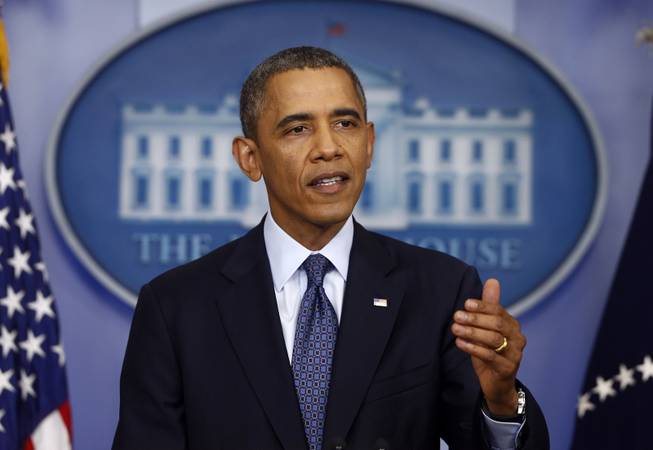
ASSOCIATED PRESS
President Barack Obama speaks about the government shutdown and debt limit, Tuesday, Oct. 8, 2013, in the James Brady Press Briefing Room of the White House in Washington.
Wednesday, Oct. 9, 2013 | 2 a.m.
A solution to the shutdown crisis seems all but guaranteed to hinge on the debt ceiling, though Democrats hoped to avoid such a confluence of events.
That is if, of course, the specter of defaulting on the national debt is terrifying enough to bring the last few weeks of political standoff to a practicable solution.
“I would dispel the rumor that is going around that you hear on every newscast that if we don’t raise the debt ceiling we will default on our debt,” Sen. Tom Coburn, R-Okla., said on "CBS This Morning" on Monday. “We won’t.”
“Will the United States default on its debt? ... The answer is, of course not,” Sen. Ted Cruz, R-Texas, said on CNN’s "State of the Union" on Sunday. “The debt ceiling historically has been among the best leverage that Congress has to rein in the executive.”
According to the U.S. Treasury, once a debt limit is met, it becomes exceptionally difficult for the United States to meet all of its financial obligations, and it is impossible to truly gauge which debts will go unpaid, as the systems “are designed to make each payment in the order it comes due.” Furthermore, because a debt limit doesn’t really distinguish between mandatory and discretionary spending, the bill that doesn’t get paid may be anything from a federal employee’s salary to your Social Security check.
To avoid that prospect, Senate Majority Leader Harry Reid, D-Nev., introduced a bill to suspend the debt ceiling until the end of 2014 — “after the mid-term elections” of 2014, as Senate Finance Committee Chairman Max Baucus, D-Mont., noted Tuesday.
The tactic would not technically raise the debt limit, but would allow the country to avoid default until January 2015, when a new ceiling reflecting all the borrowing to that point would have to be set.
Reid queued up the bill for a first procedural vote technically as early as Thursday. If it passes, it would be a way for Democrats to make good on a position they have been drumming home for months: That they will not negotiate on the full faith and credit of the United States.
But just moments later, President Barack Obama gave ground on the Democrats’ position: He would be willing, he said, to accept a short-term extension of the debt limit if it would give Democrats and Republicans time to talk it out.
“I’m prepared to talk about anything. They can design whatever format they want,” Obama said, joking at one point that he would buy Republicans dinner during the negotiations. “If they want to do that, reopen the government, extend the debt ceiling — if they can’t do it for a long time, do it for the period of time it would take these negotiations to take place.”
That leaves the door open, however, to making a political trade in exchange for raising the debt limit over a longer period of time — exactly what the Democrats said they didn’t want to do, but exactly what Republicans have said they are after.
Cruz, in the same CNN interview, said he thought the White House should make concessions on the Affordable Care Act in exchange for a hike of the debt limit.
Nevada GOP Reps. Joe Heck and Mark Amodei, in interviews with the Sun Tuesday, seemed prepared to give up the idea of altering Obamacare. But they thought raising the debt ceiling was the perfect opportunity to talk about making spending cuts.
“How can we say we’re going to give you all this money when you don’t want to talk about how we’re going to curtail our spending?” Heck said.
The dovetailing crises are pulling Congress back into a familiar mode of all-encompassing fiscal cliffs, such as the summer 2011 experience in which the government came within hours of default. And that was in a year in which there was no preexisting government shutdown, or sequestration — the across-the-board budget chop that was the eventual product of the deal they made to end that crisis.
There was even talk Tuesday that a negotiation committee House Speaker John Boehner and others were demanding Reid authorize to come up with a shutdown-ending budget compromise would actually turn into a redux of 2011’s Super Committee, which ultimately failed to come up with an acceptable bipartisan solution, setting off the sequestration cuts.
“I don’t see us having a super committee,” Heck said. “There’s going to be nothing contingent on them. It’s not like if you don’t reach an agreement, this is what’s going to happen.”
In 2011, even with the threat of sequestration hanging over their heads, lawmakers had over three months to come up with a deal.
Today, if a negotiation committee were appointed, it would have, at best, eight days to come up with an agreement before the debt limit is met on Oct. 17.
“I don’t think we’re out of it in a week,” Amodei said. “It won’t be over. And I hope I’m wrong. But it sure doesn’t feel like it.”

Join the Discussion:
Check this out for a full explanation of our conversion to the LiveFyre commenting system and instructions on how to sign up for an account.
Full comments policy